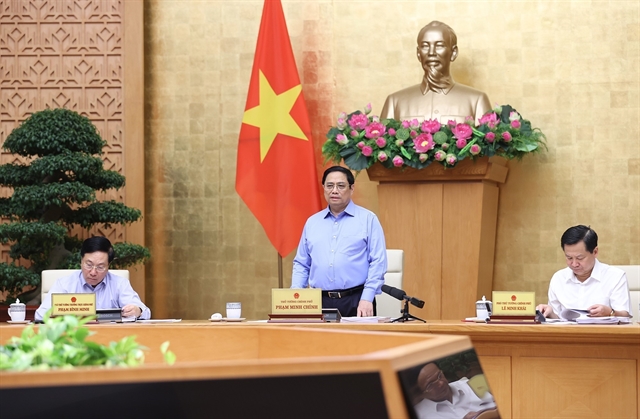 Politics & Law
Politics & Law


|
| Prime Minister Phạm Minh Chính addressed the Government's legal building meeting on Wednesday in Hà Nội. — VNA/VNS Photo Thống Nhất |
HÀ NỘI — Prime Minister Phạm Minh Chính on Wednesday requested thorough consideration and prudence during the revision of the Land Law, which is a difficult, sensitive, impactful, wide-ranging field that has interlocked relations with many others.
Addressing a Government monthly legal meeting on the draft revised laws on land, bidding, cooperatives, and prices, the PM said the revised law must institutionalise the Party’s relevant resolutions; tackle difficulties to facilitate resources for development; streamline administrative procedures and scrap bureaucratic hurdles for people, businesses, and organisations; and ensure its consistency with related laws, he said.
The Government leader also demanded the law’s content be understandable and conducive to enforcement, supervision, and examination, asking for stronger digital transformation in land management, corruption fight, power decentralisation, resource allocation, and tools for enhancing supervision to detect any problem in a timely manner.
PM Chính asked the drafting body to take in the opinions of Government members, experts, scientists, and the parties covered by the Land Law to finalise and submit the draft to the National Assembly this September.
Regarding land access of foreign-invested economic organisations, PM requested adding restrictions to access to key, sensitive areas in terms of national defence and security.
In addition, it is necessary to consider adding the provision that foreigners – who are allowed to own commercial properties, as per the housing law – are entitled to use residential land to be issued certificates of land and property rights associated with land, to make it consistent with the draft amended housing law on house-owning foreign citizens.
For cases where the State needs to expropriate land for public use, the Prime Minister suggested that it is necessary to specify in the law the criteria and conditions for these cases, avoiding the abuse of the practice especially for commercial housing projects, causing public uproar.
PM said the proposed establishment of a support fund for people whose land has been expropriated but whose working capacity is limited should be for local authorities to implement, especially for those who don’t have a regular fixed income.
With regards to the requirement that investors of industrial zones and clusters must allocate a proportion of the land area for the State to implement its land policies, the Prime Minister agreed that it is necessary to stipulate that the investor must create a land fund for the provincial People's Committee to lease to small and medium-sized enterprises and establishments being forced to relocate due to environmental pollution.
However, it is necessary to give the authorisation to localities to determine how to support these enterprises in accordance with the practical situation in each locality, and at the same time, it is necessary to study regulations on conditions and criteria for businesses so they can get access to this land fund in an open and transparent manner.
On extending the subjects eligible to receive rice-production land to include businesses and individuals not engaging directly in agricultural production, the Government leader said that this is a major issue whose impact must be exhaustively assessed, with stringent regulations and conditions attached, so that farmers can still have land for growing crops, avoiding long-lasting consequences to the whole society. — VNS




